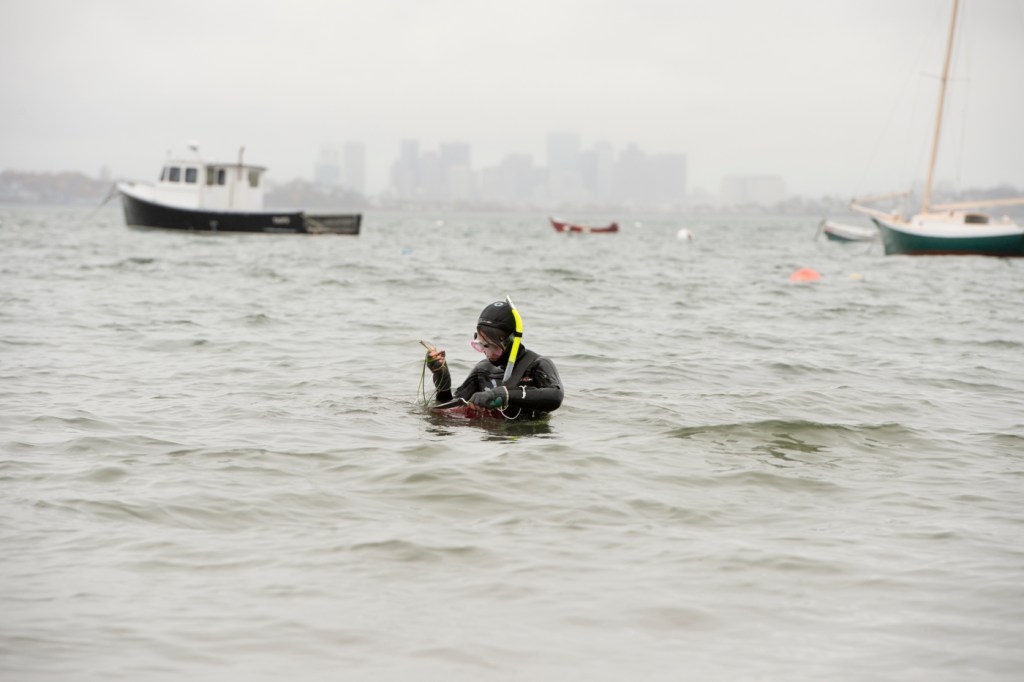A global network for marine sustainability

In this guest blog post to iNSolution, Jennifer Mocarski, who works in Northeastern’s Urban Coastal Sustainability Initiative, writes about INSHORE, a newly formed global network of marine scientists.
Earlier this semester, an interdisciplinary group of experts from around the world came together at Northeastern’s Marine Science Center to form a new international network of scientists that collaborate to advance research and understanding of how marine organisms respond to climate change.
The group, which was co-founded by Northeastern professor Brian Helmuth, is called INSHORE, short for International Network for the Study of Rocky Intertidal Ecosystems. This global web of marine scientists includes participants from Australia, Canada, Chile, China, Hong Kong, Iraq, Italy, South Africa, the U.K. and the U.S. All share an interest in organisms that live along the world’s coastlines, and the goal of INSHORE is to predict vulnerability of key marine species to ongoing and future environmental change on the world’s shorelines. INSHORE will also explore ways to facilitate the participation of scientists from developing nations in climate research, and to explore new ways of informing the public about the changes that its members are seeing.

INSHORE members from around the world, from left: Gianluca Sarà, University of Palermo, Italy; Mark Patterson, Northeastern; Wenyuan Xu, University of South Carolina; Gray Williams, University of Hong Kong; Brian Helmuth, Northeastern; Nova Mieszkowska, Marine Biological Association, United Kingdom; and Dan Distel, Ocean Genome Legacy, Northeastern.
To help understand how INSHORE will function, perhaps I should start at the beginning. Helmuth wanted to connect his colleagues who share research interests, and they too wanted to collaborate regularly and expand the group globally. Each a dot on a world map, they wanted to formally and consistently connect the dots in a way that made the sharing of data and knowledge simpler.
Fast forward to October, when five of the INSHORE members reconvened at the MSC: Helmuth; Gray Williams from the University of Hong Kong; Nova Mieszkowska from the Marine Biological Association in the United Kingdom; Gianluca Sará from the University of Palermo in southern Italy; and Wenyuan Xu from the University of South Carolina. The meeting served as the official launch of INSHORE’s new website (designed by Northeastern’s in-house design studio SCOUT), as well an opportunity to fine tune the network’s goals, and host a multi-evening workshop for the Marine Science Center and students in Northeastern’s Three Seas program. INSHORE members and Northeastern’s Ocean Genome Legacy presented to a group of 40 students and faculty of the Marine Science Center community.
Williams, director of The Swire Institute of Marine Science in Hong Kong, kicked things off with a case study in counting sea urchins at Cape d’Aguilar, a marine reserve in southeastern Hong Kong Island.
Each segment of the workshop built upon the preceding segment, as discussion topics included methodologies for surveying rocky intertidal organisms across large geographical distances, and how to use modeling methods to predict the fate of real marine populations under multiple stressors and varying conditions.

Northeastern professor and INSHORE co-founder Brian Helmuth
Next up for INSHORE is the development of international biodiversity monitoring programs that are easily transported to and adapted by other marine labs. Already Helmuth and other INSHORE members are working with colleagues at the University of Basrah’s Marine Science Center, in southern Iraq, to create a series of training videos that will explain the latest scientific methods in thermal modeling and sensor development; equip students with environmental logging devices; and facilitate new data collection and archiving, all from their corner of the globe. Working with the U.S. State Department, the group hopes to get equipment in the hands of Iraqi scientists, who can then collect data using the same methods already in use by other INSHORE members.
Williams described research done from the comfort of an office as research “done badly,” and encouraged the group to measure biological variables correctly, by getting out into the natural environment.
For INSHORE, this will mean the natural environment of one’s own coast, as well as coasts along every continent in the world.